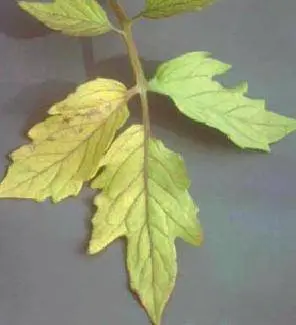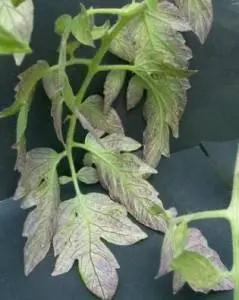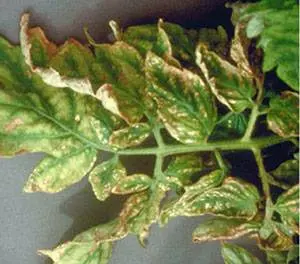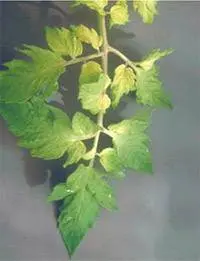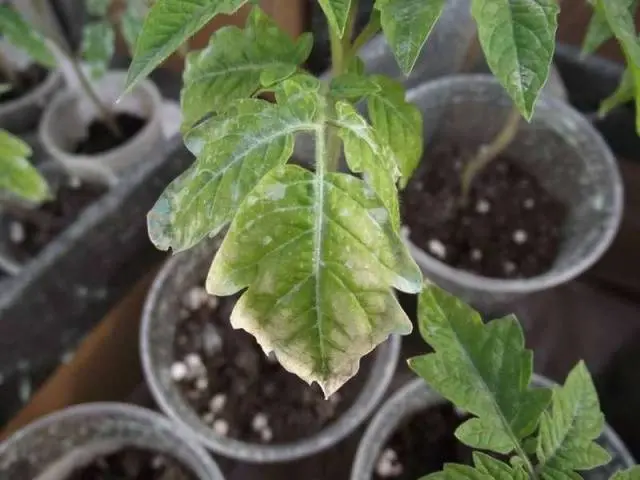Contents
Tomatoes are considered a fairly resistant plant, this crop can withstand both low temperatures and extreme heat, tomatoes can be grown in any region of the country, planted seedlings in a greenhouse or in an open garden. But, despite all the advantages, tomatoes are prone to various diseases, and the main enemy of tomatoes – late blight, is known to every gardener. What are the symptoms of this disease, many know. But there are other “ailments” of tomatoes, less well-known.
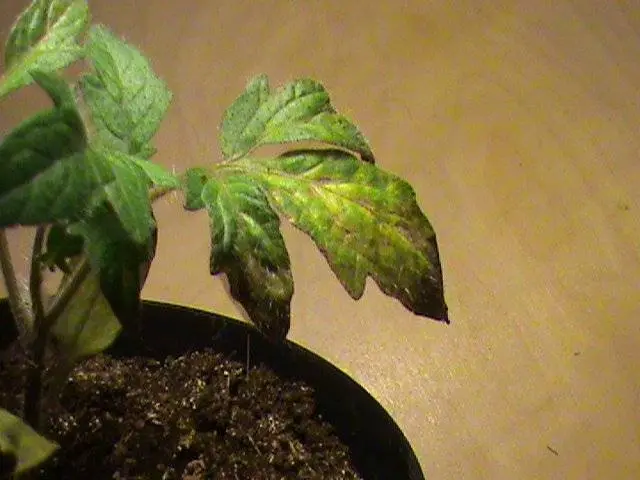
What these or those spots on the leaves of tomatoes testify to, why the bushes dry or shed their ovaries – this is what this article is about.
Manifestations of diseases in tomatoes
Tomato leaves are a kind of indicator that can tell about the general health of the plant. That is why the bushes of adult tomatoes, as well as their seedlings, should be regularly inspected in order to identify the disease at an early stage.
Most often, it is adult plants that get sick, but tomato seedlings can also turn yellow, wither, or become covered with strange spots for an unknown reason. How to diagnose a disease of tomato seedlings?
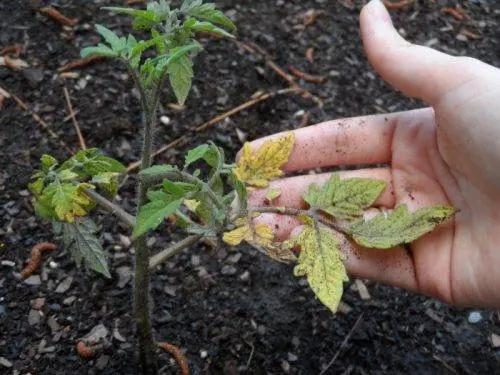
To understand what is happening with tomatoes, it is necessary to examine all the plants well, and not only their foliage, but also the stem, buds, ovaries, and even the ground around the bush.
The most common manifestation of various problems with the “health” of tomatoes is the drying of the leaves. The fact that the leaves of tomato seedlings dry may indicate one of several problems:
- Insufficient watering.
- Excessive soil moisture.
- Too dry air in the room where tomato seedlings are grown.
- Deficiency of one of the trace elements.
- Soil acidification.
Lack of moisture in the soil
The first thing that comes to mind when you see yellowed, withering tomato leaves is that the plants lack moisture. However, this is not always true.
Indeed, insufficient watering leads to yellowing of tomato leaves. But apart from this indicator, moisture deficiency causes lethargy of the stem, dropping of inflorescences and fruits.
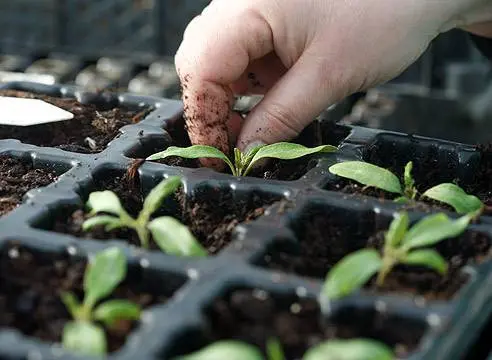
The land between the bushes will also tell about insufficient watering: if the soil is cracked, it has taken on a crust, it must be loosened.
It often happens that only the top layer of the earth weathers and dries up, and under it there is a fairly moist soil.
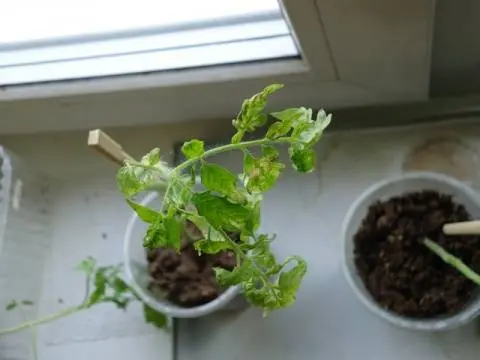
Tomatoes need to be watered correctly:
- do it rarely, but plentifully. Frequent watering with small portions of water will harm the tomatoes – they will be waterlogged. Tomatoes are suitable watering schedule 1-2 times a week.
- When watering tomatoes, it is very important to ensure that water does not fall on the leaves and even the stem of the plants. Tomatoes are watered under the root from a watering can with a thin spout or from a garden hose. While the tomatoes are in the stage of young seedlings, it is best to water not the sprouts themselves, but the ground between them.
- Water for watering seedlings of tomatoes should be at room temperature – about 23 degrees. Cold water will lead to fungal diseases of tomatoes and slow their growth. Adult plants are also best watered with warm settled water.
- Fertilizers and dressings for tomatoes must be applied along with irrigation: all substances are pre-dissolved in warm water.
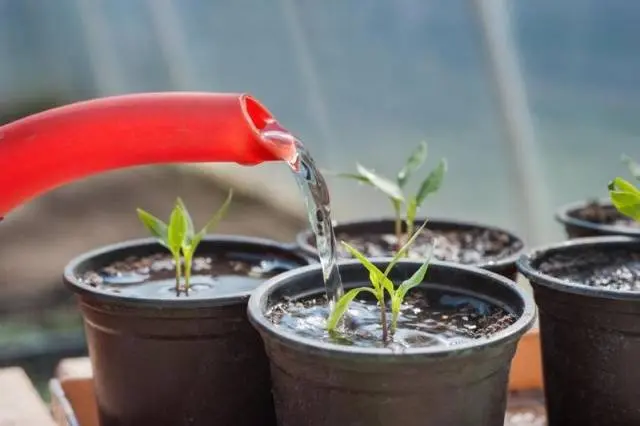
Too much moisture
Strangely enough, but Excessive watering also leads to yellowing of tomato leaves. The leaves become lethargic, their edges turn yellow and dry, the bushes can shed their ovaries or inflorescences.
Excessive watering is very dangerous for tomatoes, it often causes bushes to become infected with fungal “ailments”, rotting of roots and stems, and cracking of fruits.
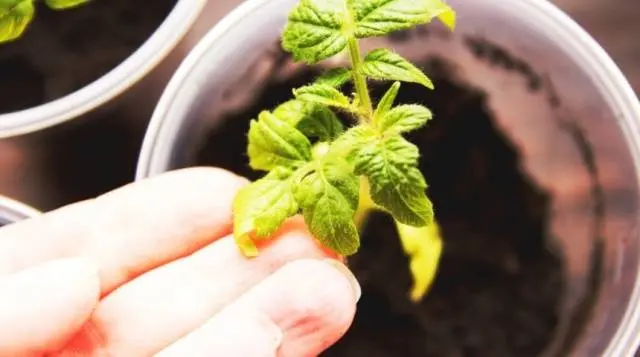
If the seedlings are watered too often, they will certainly turn yellow and disappear. You can save the situation only at an early stage of the problem:
- seedlings are watered with warm water;
- after a few hours (when the soil gets wet), the plants are carefully removed outside;
- inspect the roots, trying to identify rotten parts of the root system;
- if the roots are in order, the seedlings are transferred to a new soil;
- water the transplanted tomatoes with a solution of manganese;
- normalize the irrigation regime.
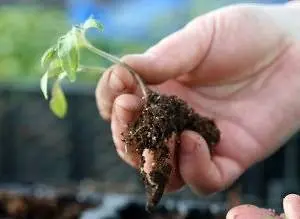
In order for tomato seedlings to properly consume moisture, containers with plants should be placed on a well-lit window, monitor the level of humidity and temperature in the room. Indeed, it is often the low temperature that becomes the cause of waterlogging – the water evaporates for too long, the tomatoes dry and turn yellow.
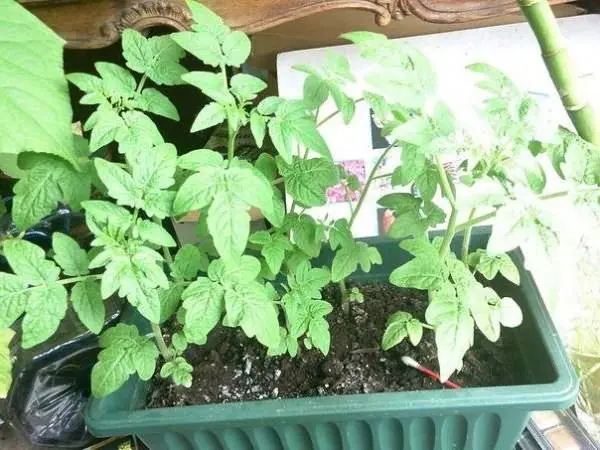
Pots and boxes with tomatoes need to be rotated regularly, only in this way the plants will not stretch out in search of the sun, the tomato seedlings will be powerful and strong.
Dry indoor air
Due to too dry air in the room where the tomato seedlings are located, the plants can also be seriously affected. The fact is that the birthplace of tomatoes is warm countries with a humid climate. This culture simply needs warm air with droplets of moisture, tomatoes absorb it through their leaves.
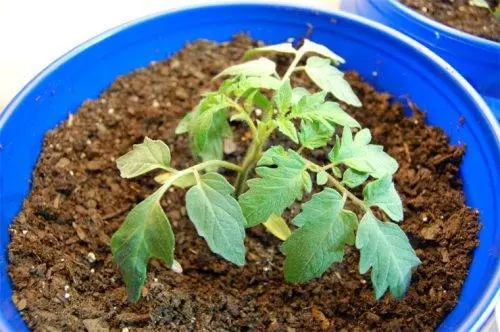
In an effort to provide seedlings of tomatoes with the temperature they need (24-26 degrees), gardeners often forget about air humidification. Indeed, at this temperature, the moisture in the room will evaporate very quickly, the air will become dry, which will cause the tomato leaves to dry and turn yellow.
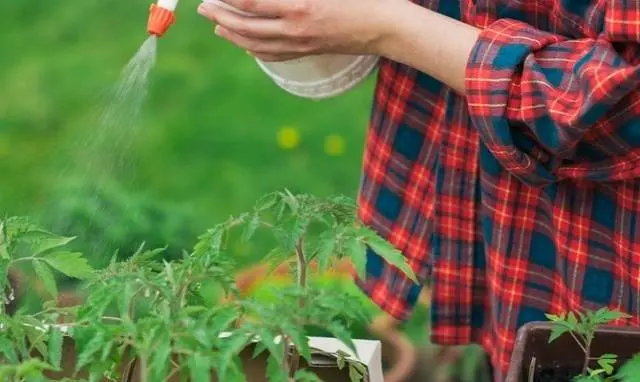
You can correct the situation with a conventional spray gun. Several times a day, you should spray the space around the containers with seedlings, trying not to direct the wet jet directly at the tomato bushes.
Another way is to arrange containers with a wide neck around the room and fill them with water, from such vessels the water will evaporate faster, saturating the air and seedlings with moist warm steam, which they need so much.
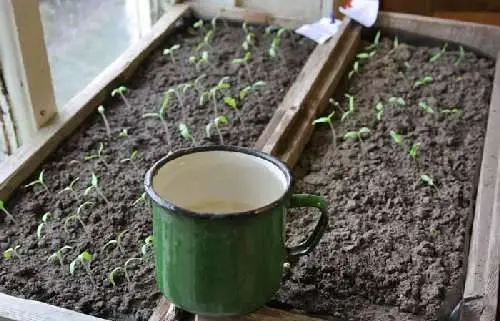
Insufficient amount of trace elements
For normal development, tomatoes throughout their “life” need a whole range of minerals: nitrogen, potassium, copper, manganese, boron and phosphorus. Without these components, seedlings and adult tomato bushes will begin to die, and tomato leaves will signal this. Moreover, the manifestations of a lack of trace elements in each case look different:
- If the lower leaves on the tomato bushes dry and crumble, while the plant becomes lethargic, the color of the foliage is faded, and the newly emerging leaves are small and inconspicuous, this indicates a lack of the most important component for tomatoes – nitrogen. When applying nitrogen-containing fertilizers, it is very important not to overdo it, because an excess of this trace element is also detrimental to tomatoes. Due to too abundant nitrogenous top dressing, the stem of the seedlings becomes thick, the leaves become powerful. Such seedlings of tomatoes look attractive, but it will be very bad to bloom and bear fruit, all the forces of the plants will be spent on building up green mass.

- If, when examining the bushes, a red vein is found on the outside of the tomato leaf, then the plant signals a lack of soil phosphorus. You need to take care of filling the deficiency of this component and fertilize the tomatoes.

- When the lower leaves turn yellow, and their edges are wrapped outward, this indicates a lack of potassium. In this case, young seedlings can be fertilized with powdered dried banana peels, or a special fertilizer can be used.

- The gradual and slow yellowing of the entire tomato bush indicates that the tomato is lacking gland.

- Marble spots on the leaves of seedlings indicate that she needs magnesium.

Soil acidification
The yellowed edges of tomato leaves can also speak of the so-called souring or salinization of the soil. Outwardly, this problem manifests itself in the form of a white or yellow coating on the surface of the soil.
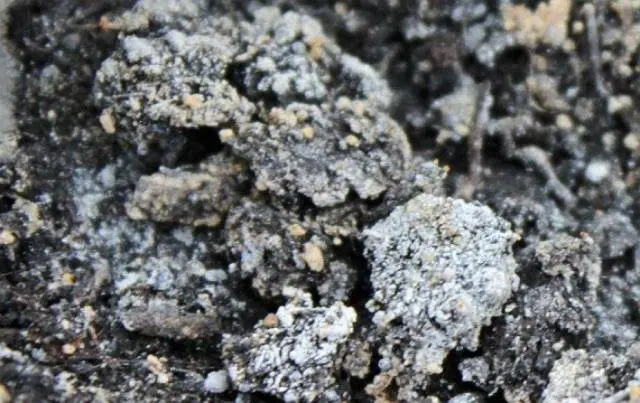
Plants cannot consume the substances and water they need from such soil, so the tomato draws all the nourishment from its own trunk and leaves, saturating the roots. As a result, the bush disappears simply by “eating” itself.
The cause of such an unusual disease may be too hard water, which the gardener uses for irrigation. After all, it is recommended to water seedlings of tomatoes only with settled and boiled water in order to ensure softness of the liquid, remove heavy impurities and chlorine from the water.
The same thing happens with tomato seedlings, when the soil contains too much mineral fertilizer – the soil is “oversalted”.
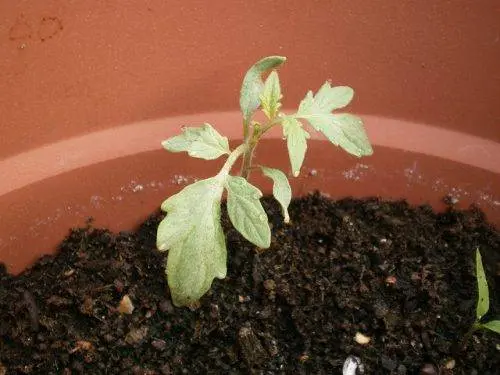
You can correct the situation in this way:
- the top layer of soil between the plants is carefully removed – a centimeter depth is enough;
- instead of spoiled soil, a layer of fresh soil is introduced;
- tomatoes are watered only with settled or filtered water, watching for its softness;
- for two weeks, in order to prevent seedlings, no fertilizers are applied.
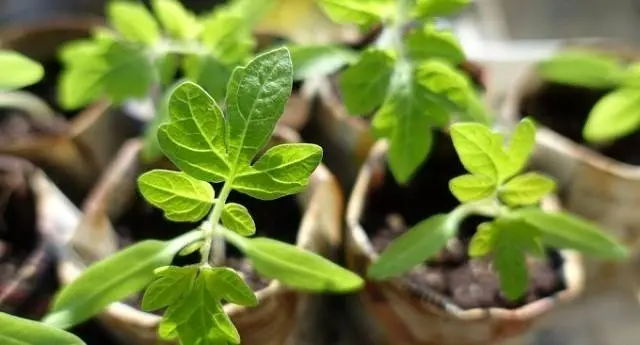
Therefore, if it is possible to collect such moisture, it must be used. Tomatoes, watered with melt or rain water, develop faster than their counterparts, grow stronger, give a good harvest.
Results
The problem of drying tomato seedlings must be approached comprehensively. Before taking any measures, you need to analyze the situation, carefully examine all the plants and the soil under them, and based on the data obtained, draw specific conclusions. After all, instead of helping, affected tomatoes can get even more harm.
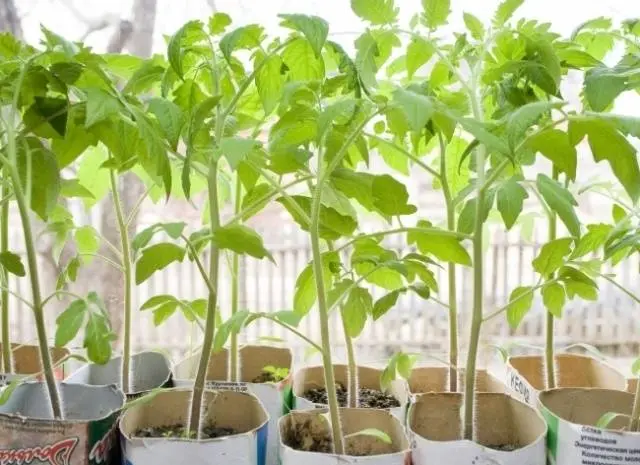
It is also very important to identify the problem at an early stage, this is the only way to save the seedlings. Otherwise, the tomatoes will simply have to be thrown away, and it may be too late to plant new seedlings.










